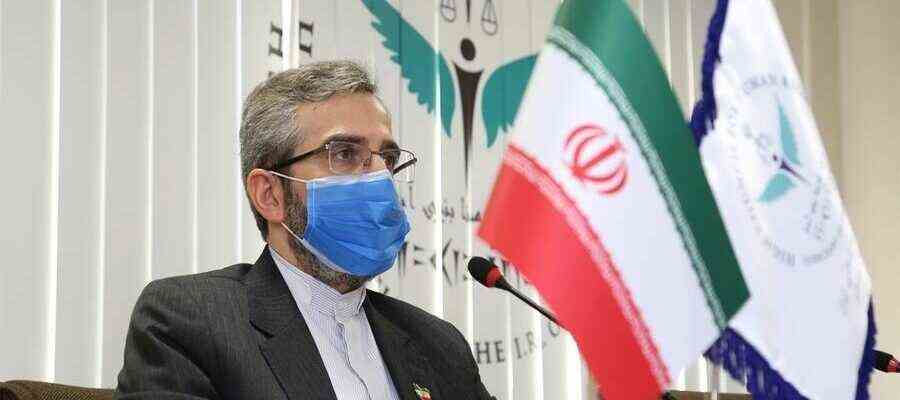When the US special envoy for Iran, Robert Malley, left Vienna in mid-June, he left a couple of suits hanging in the hotel. Like other Western diplomats, after the sixth round of nuclear negotiations with Iran, he assumed that the next would follow a few weeks later – regardless of the upcoming presidential election in the Islamic Republic.
But it was to be the final meeting of the negotiators for a long time. Four and a half months later there is at least a new date: November 29th. First of all, the new Iranian negotiator Ali Bagheri-Kani has it announced via Twitter and a little later his EU colleague Enrique Mora confirmed.
This was preceded by a clear warning: The heads of state and government of the USA, France, Great Britain and Germany had at the G-20 summit on the weekend in Rome explained togetherthat “Iran’s further progress in the nuclear field” and the “obstruction of the work of the International Atomic Energy Agency” (IAEA) “endanger” the possibility of a return to the nuclear deal. Only by urgently concluding negotiations “can we avoid a dangerous escalation,” it said.
The Iranian side did not show any urgency. First, Tehran let it know that it needed time for President Hassan Rouhani’s outgoing negotiating team to familiarize the new team of his successor Ebrahim Raisi with the state of negotiations. Bagheri-Kani then asked for clarifications on passages of text that had already been negotiated. He met Mora in Tehran and recently in Brussels – and the Iranian actually wanted to speak to each of the three European contract partners separately.
The negotiations are getting more complicated than they already are
The already complex format of the talks in Vienna is likely to become even more complicated: So far, it has mainly been the Europeans who have negotiated with the Iranian delegation, with representatives from Russia and China also taking part. The Europeans then spoke to the US negotiator Malley because Iran refuses to sit at the table with the Americans. That will not change – only that, according to Western diplomats, Bagheri-Kani does not intend to negotiate in English like his predecessors. With an interpreter, however, the process is even more time-consuming and complicated.
It is also unclear whether Iran is ready to resume negotiations at the point at which they were suspended in June, as Russia’s representative, Ambassador Mikhail Ulyanov, called for. The government in Tehran, which is dominated by hardliners, is calling for a “new mode” of talks, the talks previously held in parallel working groups on the subjects of sanctions and nuclear issues.
This is obviously an attempt to lift all bilateral sanctions imposed by the US – while the US is only willing to end the punitive measures imposed in connection with the nuclear dispute, but not those imposed, for example, for supporting terrorism or for human rights violations . The negotiators had come a long way on this point in June.
Iran is demanding guarantees that US President Biden will hardly give
The spokesman for the Iranian Foreign Ministry, Said Khatibzadeh, again pointed out in Tehran that it was the USA that had left the agreement first. “Until we have ensured that the US sanctions are lifted effectively and immediately, we will not stop any of our remedial measures,” he said, referring to the expansion of the Iranian nuclear program. The US is making its return to the agreement dependent on Iran complying with the restrictions on its nuclear program again – which is no longer possible in some areas, such as the development of high-performance centrifuges, because Iran has gained knowledge through tests that were banned under the agreement are.
Even legally binding guarantees from the USA, demanded by Iran, not to withdraw from the agreement again, will hardly be given by President Joe Biden. The government rejects this, also because the agreement has no chance of ratification in the Senate. But Biden has promised to leave it only if Iran fails to meet its obligations. Ulyanov rated this as an “important step”. The Secretary of the Supreme Security Council in Iran, Ali Shamkhani, has just made similar guarantees again a condition for a degree . If nothing changes in the current situation, the outcome of the negotiations will be clear, he says.
The talks will therefore be complicated, especially since Iran is pushing ahead with its nuclear program and has severely restricted cooperation with the IAEA. Iran does not have to fear that it will be formally criticized for this in a resolution by the IAEA Board of Governors. The Europeans had refrained from doing so twice so as not to make a return to the nuclear negotiations difficult. The 35-member body will meet from November 22nd to 26th – the week before negotiations are due to resume.

